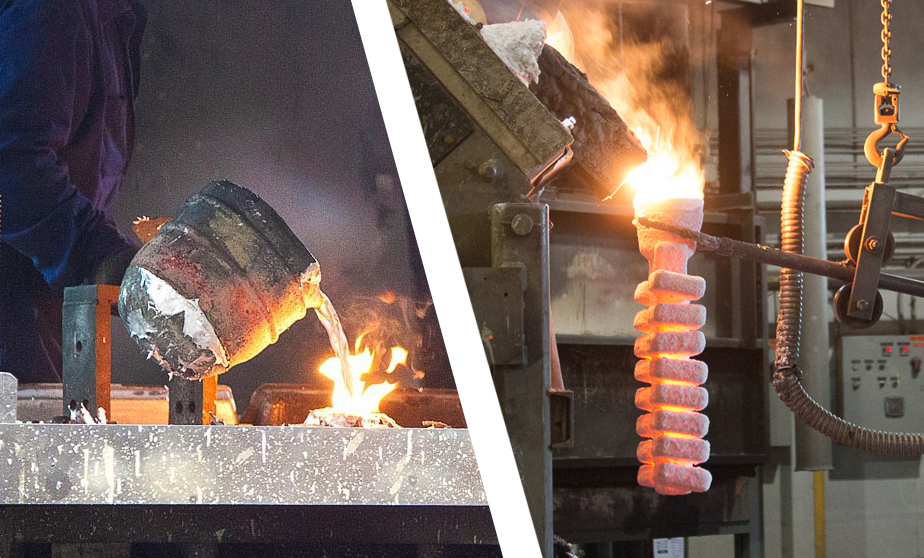See This Report about Stahl Specialty Company
See This Report about Stahl Specialty Company
Blog Article
The 20-Second Trick For Stahl Specialty Company
Table of ContentsThe 15-Second Trick For Stahl Specialty CompanyThe Facts About Stahl Specialty Company RevealedAn Unbiased View of Stahl Specialty CompanyExcitement About Stahl Specialty CompanyTop Guidelines Of Stahl Specialty Company
The refined difference exists in the chemical content. Chemical Contrast of Cast Aluminum Alloys Silicon advertises castability by lowering the alloy's melting temperature and enhancing fluidness throughout spreading. It plays a vital function in enabling intricate mold and mildews to be filled accurately. In addition, silicon contributes to the alloy's toughness and wear resistance, making it useful in applications where longevity is important, such as automotive parts and engine parts.It also boosts the machinability of the alloy, making it easier to refine right into ended up items. By doing this, iron contributes to the total workability of aluminum alloys. Copper increases electrical conductivity, making it advantageous in electrical applications. It also improves deterioration resistance and includes to the alloy's general strength.
Manganese contributes to the toughness of light weight aluminum alloys and boosts workability. Magnesium is a lightweight element that provides strength and effect resistance to light weight aluminum alloys.
It allows the production of lightweight components with excellent mechanical residential or commercial properties. Zinc improves the castability of aluminum alloys and assists manage the solidification process during casting. It improves the alloy's strength and solidity. It is frequently located in applications where elaborate shapes and fine details are needed, such as attractive castings and particular automotive components.
Examine This Report about Stahl Specialty Company
Because aluminum-silicon alloys have excellent spreading residential or commercial properties, high gas buildings, easy processes, and superb deterioration resistance, aluminum-silicon alloys are most commonly made use of in the die-casting industry in the house and abroad. At the exact same time, aluminum-silicon alloys are also relatively very early and widely identified alloys developed and utilized in die-casting. After continual research study and enhancement, a lot of the existing worldwide mainstream aluminum-silicon alloys have been finalized and are nothing greater than A356, A360, A380, ADC12, B390, and A413.
The key thermal conductivity, tensile toughness, return strength, and prolongation differ. Amongst the above alloys, A356 has the highest thermal conductivity, and A380 and ADC12 have the least expensive.

The Basic Principles Of Stahl Specialty Company
In accuracy spreading, 6063 is fit for applications where elaborate geometries and top notch surface coatings are critical. Instances consist of telecommunication units, where the alloy's superior formability enables for streamlined and aesthetically pleasing styles while keeping structural stability. In a similar way, in the Lights Solutions sector, precision-cast 6063 elements develop elegant and reliable illumination components that call for detailed forms and great thermal performance.
(https://urlscan.io/result/0195897f-20fd-7001-a6ac-ce9798aafe78/)
The A360 displays premium elongation, making it suitable for complex and thin-walled elements. In accuracy casting applications, A360 is fit for industries such as Consumer Electronic Devices, Telecommunication, and Power Devices.

In precision spreading, aluminum 413 radiates in the Customer Electronics and Power Devices industries. This alloy's remarkable corrosion resistance makes it an exceptional choice for outside applications, guaranteeing long-lasting, long lasting products in the mentioned sectors.
Stahl Specialty Company Can Be Fun For Everyone
As soon as you have chosen that the aluminum pass away casting procedure appropriates for your project, an important next step is selecting the most proper alloy. The light weight aluminum alloy you select will significantly affect both the casting procedure and the properties of the last item. As a result of this, you have to make your decision carefully and take an educated technique.
Figuring out the most appropriate aluminum alloy for your application will suggest evaluating a wide array of features. The initial category addresses alloy attributes that influence the production process.
The alloy you choose for die casting directly affects a number of aspects of the casting process, like exactly how easy the alloy Find Out More is to function with and if it is prone to casting flaws. Hot splitting, additionally called solidification fracturing, is a common die spreading defect for light weight aluminum alloys that can cause interior or surface-level splits or splits.
The 10-Second Trick For Stahl Specialty Company
Specific aluminum alloys are a lot more at risk to warm fracturing than others, and your option should consider this. Another common problem found in the die casting of aluminum is die soldering, which is when the cast sticks to the die wall surfaces and makes ejection hard. It can damage both the cast and the die, so you need to search for alloys with high anti-soldering homes.
Corrosion resistance, which is currently a remarkable feature of aluminum, can differ substantially from alloy to alloy and is an essential characteristic to consider depending upon the ecological problems your product will certainly be revealed to. Use resistance is another residential property frequently sought in light weight aluminum products and can differentiate some alloys.
Report this page